#and so there is this cycle of alienation and isolation
Explore tagged Tumblr posts
Text
Had an epiphany during class that my WIP actually is in an important way, thematically anti-mindfulness.
#no wait listen#first that I'm taking of mindfulness as narrow as in meditation based on the principle of emptying one's mind in detachment of reality#and in general it makes sense for the story because it's imbued with my obsession with communities and communitarianism#and the way MacIntyrean communitarianism highlights how key the concept of alienation is to the psychological evils of unbriddled capitalis#and so there is this cycle of alienation and isolation#but what these characters need in order to heal is to reconnect#Reconnect with the natural world to understand that healing is possible and so is permanence#and reconnect with others to find good in the world#but most importantly to finally find the knowledge of themselves they so desperately seek in their own introspection#That's why Rick Astley's Rise Up is still such a fitting song for the story#when the heavy words have fallen/and I reconnect to you/that's when I rise up#cause between us/I find myself when I open up to you#it's almost a chestertonian paradox but in a much more classic way#If St. Augustine turns inside to find the Other he was searching for outside#it makes sense in a mirror way to turn outside to find the one you were searching for inside
9 notes
·
View notes
Text
i feel like a lot of Jason and Bruce's relationship can only be explained if you understand the depth of Jason's isolation while living with Bruce and the depths of codependency the dynamic fostered.
Unlike Jason's predecessor and his successors, Jason never had a superhero team. He wasn't deeply connected to the superhero community. He didn't really even have friends. His world was school, the manor, and Batman and Robin. Robin, being a piece of his identity and his first sense of belonging. Batman and Robin as a dynamic requires synchronicity and a lack of questioning. It's about doing what Batman says. Jason, who lived in constant fear of being abandoned again, or kicked out, did his damnedest to not step a toe out of line. Jason was looking for safety and a parent who loved him, and Bruce stepped into that role in a way Jason had never experienced before. (mind you, Bruce himself was dealing with the conflicts regarding his relationship with Dick and no longer have Dick's presence.)
When Bruce and Jason started to have tensions themselves over 'excessive force' and the Garzona's situation, that read to Jason like rejection. And rejection, in a codependent relationship is cause for severe alienation and isolation. Jason had zero people to turn to; and the single person he loved most in the world didn't trust him anymore. Bruce had ripped the little bit of emotional safety that Jason felt away. So Jason went to find a mother who might want him.
point is: Jason Todd can never leave Bruce Wayne. Not in the way his other siblings can. Bruce Wayne is the center of his universe, and the only person Jason ever fully trusted. Jason wrapped his identity into being loved by Bruce, into being the son of Bruce. Into being Batman's Robin. Which is why being replaced felt like confirmation of all of his worst fears. It's why nobody else seems to understand the depths of this betrayal the way Jason does. Jason thinks his relationship with Bruce is normal. He thinks that Tim has replaced Jason in this codependent bond. That Tim has somehow played the part better than Jason did.
It's why Red Hood can't ever move on without Bruce proving to him that he is worth killing the Joker for. It's why Jason keeps crawling back to the batfamily despite the constant cycle of abuse and conflict. Bruce is gravity, Bruce is the sun, and Jason's world revolves around him and what Bruce says about him. If Bruce says Jason isn't worth it, then he's not. If Bruce says Jason is, then he is. They're soOOoO "Love me like a god and I'll betray you like a man" "I bet on losing dogs" "i'm going to die in the universe you loved me in (before you decided you didn't)" "I was fifteen when you left and I have been fifteen ever since" "losing your faith in your parents feels like losing faith in your religion"

@prlssprfctn <- bless you for this panel <3
#I think dick and Jason easily have the most codependent relationships with Bruce#but Dick didn't have the same specific parental abandonment issues that Jason did#and Dick wanted to be free#and Jason wanted to be wanted.#seems neither got what they wanted#Jason todd#batfamily#dick grayson#Bruce wayne#batman#jaybin#Robin#DC comics
2K notes
·
View notes
Text
theres this quote running around from jacob anderson where he talks about how historically black people have been removed from period dramas and how, as suggested by the interviewer (w/ blueiight embellishment ofc), the very few times black charas would show up in these period pieces theyd be side characters delegated to a raceblind narratively incoherent plot to placate an audience ashamed with / of the nuances of blackness. i rly like how he said louis’s character represents both a ‘black and very human story about a vampire… [Black people] do not usually have the opportunity to play such complex and fluent characters’. i think that brings to heart a lot of why this show has my heart, as an armchair historian and r.n. (dont ask what that stands for). u racebent characters in a way that coheres, situate ur black characters in a specific context, and the story never deludes us into thinking the mere existence of an interracial relationship is enough to end racism. in e2 louis literally says “fledgling sounds like slave, dont call me that” and e3 starts with louis telling lestat the history of dismembering runaway enslaved ppl & placing their bodies on the gates of of jackson square.. in his initiation to vampirism, louis is moved from the historically Black creole treme area he grew up in & is placed into lestat’s townhome in the very white, french, old quarter. vampirism as hes initiated into is a loving, powerful, cruel, and isolating existence for louis. bc of vampirism he is able to kill a racist person and not be lynched for it, hes able to echo the historical dismemberment on the alderman by placing his body on the st louis cathedral, but he is unable to kill racist groups & systems that initiate race riots. his connection to claudia in s1 is not so much by the oedipal, but by both their connection as lestat’s fledglings and as Black [creole] people placed in a part of the city largely alien to them both. this connection can be broken down even further. louis saw claudia as his joychild of sorts, ‘[his] redemption’ for his 5 years of pimping but a big part of her tragedy is that a child being made into a vampire cannot redeem anyone, much less redeem an individual from what was a historical inevitability. claudia is adopted into such a stature that she wouldve otherwise never reached by virtue of being made a vampire, but even then that is conditional. claudia is rendered inert from being anyone’s ‘wife’ forever trapped in the confines of immaturity as a ‘daughter’, only hoping at best to be louis’s ‘sister’ and isnt that resonant to bw.. she’s selectively infantilized both a child ‘meddling in the affairs of her parents’ , ungrateful, arrogant, and adultified - presumed powerful enough to ‘poison louis against [lestat]’ , taking on the role of louis’s ‘knight in vengeful white black’ .. the response lestat has to claudia is characterized by him continuing the cycle of abuse he once faced toward her and with a black claudia who was once a poor girl now adopted into this immortal luxury it takes on a racialized element. “bach is beyond you” and claudia bites back with “yes this french music is hmm. not made for these mongrel ears”. the absence of metaphor is striking!! literally the fact that this show does not shy away from the era its set in is why its so good.
#yn.#iwtv#louis de pointe du lac#claudia#family from hell#Wait its more than 5 years. whats 5 (mortal) + 7(vampire) years
3K notes
·
View notes
Text
Happy International Lesbian Day! Here's some super brief book recs to celebrate
Books dealing with love, loss, longing and abandonment
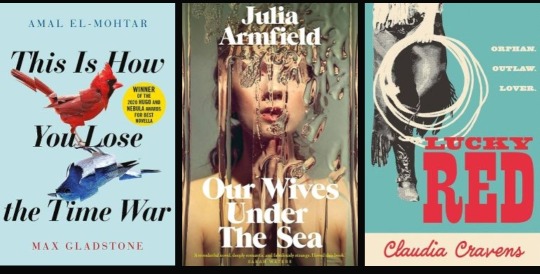
This is How You Lose The Time War is a short but beautifully written epistolary novel between two agents on opposite sides of a time war as they slowly fall in love.
Our Wives Under the Sea is one of the most beautifully written debuts I've ever read about a woman whose wife comes home wrong after they thought she'd died at sea and how it feels to grieve the loss of someone who's still in your home.
Lucky Red is a western novel about a young girl working in a brothel who meets her first female gunslinger and falls head over heels for her, and the consequences that come with loving dangerous people.
Body horror galore
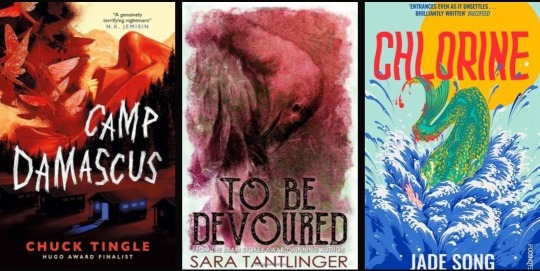
Camp Damascus is about a young woman living in a super conservative christian town built around the worlds most successful conversion camp and the horrors that are uncovered there when praying the gay away fails.
To Be Devoured is about a woman whose fascination with the local vultures turns into obsession and the urge to know what carrion tastes like overtakes her life and leads her down stranger and stranger paths.
Chlorine is about a girl whose entire life revolves around being a competitive swimmer, and how abuse, neglect, and obsession with being the best takes its toll on the young women caught up in these destructive cycles.
Flawed character studies

Big Swiss is about a woman who has a kitchen floor reset in her 40s, moves away and starts a new life as a transcriber for a sex therapist and becomes obsessed with one of his clients before inserting herself into this poor woman's life.
The Seep is a speculative sci-fi set in a future where there's been a quiet alien invasion that has given people the ability to make almost any changes to their own bodies and what that world feels like to someone who doesn't want to partake.
Milk Fed is about a woman in therapy who feels cut off from almost everything until she meets another woman who triggers in her a melding of sex, hunger, and religion and where that takes her. Huge trigger warnings for ED content. It gets tough, y'all.
Fantastical wlw books
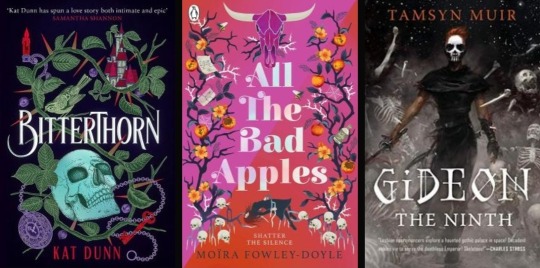
Bitterthorn is an amalgamation of fairytales retold as a slow burn sapphic love story between a sad young girl from a cursed land and the evil witch who takes her as a companion in the latest of the generational sacrifices made to appease her.
All the Bad Apples may be set in contemporary Ireland but it is a fairytale following a young girl as she travels across the country looking for a sister she refuses to believe is dead and the people she meets along the way.
Gideon the Ninth needs no introduction on this site but for the sake of formatting - lesbian necromancers in space who find themselves in an isolated murder mystery plot. It's not a romance but it is a love story and this series will change your life if you let it.
Translated novels
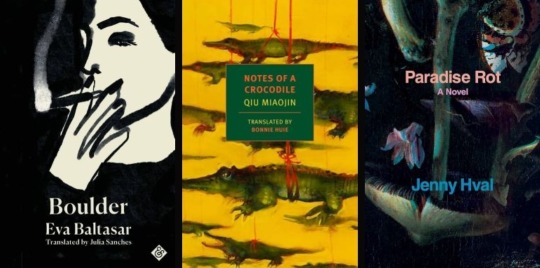
Boulder is a short character study following a free spirited woman when she accidentally settles down with the woman she loves and how love and resentment can take up the same space in your chest when life doesn't turn out the way you hoped it would.
Notes of a Crocodile is a cult classic coming of age story about queer teens in Taipei in the 1980s. It was written in the 90s so please keep that in mind if you choose to read it.
Paradise Rot is about an international student studying in Australia and her growing obsession with her housemate as they share a space that allows no privacy. I've never read anything that feels stickier.
#international lesbian day#book recs#long post#maybe a too long post#but i had the recs so here we are lol#this is how you lose the time war#our wives under the sea#lucky red#camp damascus#to be devoured#chlorine#big swiss#the seep#milk fed#bitterthorn#all the bad apples#gideon the ninth#boulder by eve baltasar#notes of a crocodile#paradise rot#i ran out of tags 😭😭😭#booklr
1K notes
·
View notes
Text
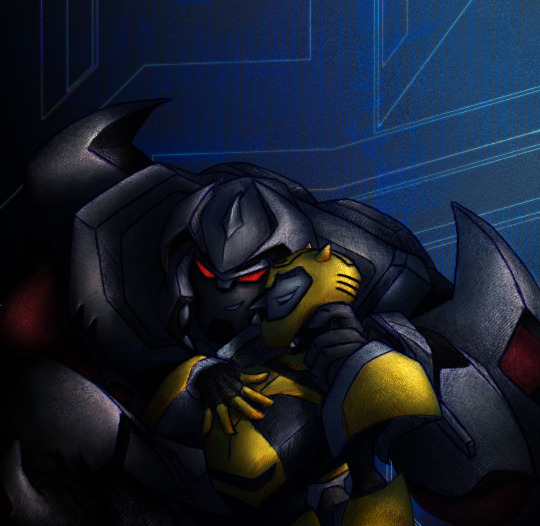
“Think you can handle what I had in mind for a today’s session, Bumbler?” The Decepticon rumbled while caressing the helm of a companion with a single digit in a calming, if slightly playful, manner. “I am the one choosing location and activity after all.”
Quiet question seemed to pull Bumblebee out of his inner musings. He blinked and looked down at a broad, grey colored chest. There’s no Decepticon symbol to be found there, just as there was no Autobot symbol engraved on his own chest plate either.
Both of them were not part of their respectful factions in that place - simulation did not allow it to happen, thus highlighting the reached neutrality between two parties. Nothing there was real, even if it seemed or felt like one, and never was portrayed accurately to real state of things. Just like Cybertronian armor of theirs, something so personal which felt almost alien by that point.
Bumblebee was not the same unsophisticated person he was prior that grueling journey.
Megatron was not the same mech who’s been haunting minibot in his sleep on a duration of a 50 stellar cycles long stasis.
… a more forgiving part of Bumblebee wished to trust his partner, the one patiently waiting for his response. Because belief in their truce was giving a chance of reaching something more meaningful.
It was the reason why that notion in combination with a promise of a challenge in a Decepticon’s gaze made Bumblebee feel relieved and more confident of choices he made.
“Have more faith in me, Meg! After you’ve agreed to participate in that gliding session upon Lake Erie, I am ready for anything you’ll throw my way.”
----------
Mix of depression with health issues and mad schedule at work is not a fun thing to experience. Hence a prolonged hiatus. But I am glad to see this picture being finished after all these weeks of a slow progress).
To be honest, I have never predicted MegaBee ship evolving into such an important thing to me, coming to my rescue second time in a row (in terms of motivation to create). The narrative around this duo has grown from a mere joke to a full on serious plot. In a way it's given me a rare opportunity to look into some philosophical concepts and to study them through Bumblebee's and Megatron's unique perspectives. And I can only hope that you'll enjoy what I am planning to share with you in a near future).
P.S. Full "oneshot" can be found below alongside two close-ups of a painting, as well as a photo of a traditionally drawn base. Yes, pens-only miniart strikes back again with canvas measuring 9x9 cm)).
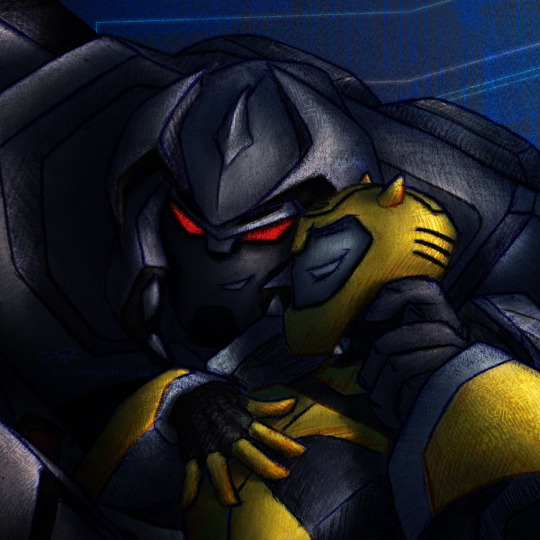

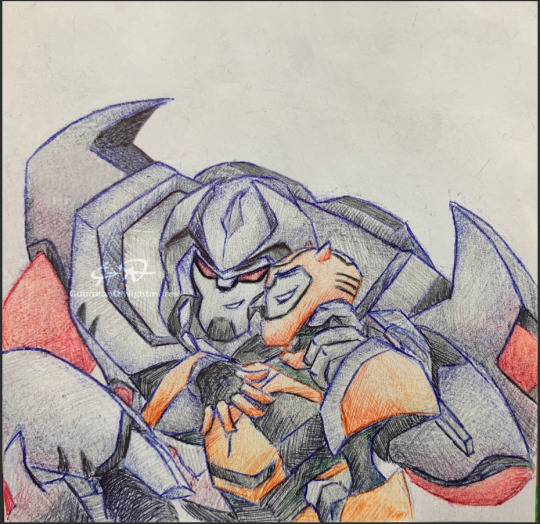
Megatron stretched his back cables and limbs, the biolights feebly glowing along the edges of reconstructed Cybertronian armor. The HoloRing around his helm has disappeared, signaling the end of an upload of a memory unit into a simulation module. As if to prove it, the Zero SubMental level began to change, the array of data scattering around in peculiar patterns alongside twisting geometric lines, the latter rearranging the place around to suit the input information.
Mesmerizing as it was, Bumblebee found himself unable to tear a wary gaze away from his companion. A bizarre thought struck him then, one which, he knew, was birthed out of sheer isolation, both mechs’ve found themselves stuck in.
A thought that the Earth based variant of a grey Decepticon’s armor was more preferable to a minibot than his native one. Gone was the familiar simplicity of cubic shapes, being replaced with flowing lines which ended in sharp angles and spikes. Everything in that armor seemed to glint in something akin to predatory agitation under ever changing light source of a subreality.
That was a stark reminder of who exactly Bumblebee was dealing with, and it made an anxiety in his Spark feast upon his qualms.
After what was, most certainly, mere several nanoclicks, those ruby optics got locked straight on an Autobot, making him instinctively hold his breath. It was uncalled for, really, but he could not help himself.
The last time Megatron was looking at him that way was during their very first confrontation on Omega Supreme.
Said distress in a smaller mech has not gone unnoticed to the Decepticon. Part of him relished in realization he was still capable of putting minibot in place if needed, but that was not his intent. Not that time.
Intensity of Megatron’s gaze dropped a certain amount, despite a glow of optics staying at the same level. An all enveloping EM field was tucked close to a frame, its owner squatting down in order to appear less intimidating (even if he’s still slightly towering over a standing minibot).
It was the first time in their interactions when an Autobot had enough courage to look straight into enemy’s face with barely any space left between them.
Bumblebee suddenly realized that at a such close proximity he could finally make out the outlines of pupils in Megatron’s optics.
… those optics which once spoke of a murder.
… he’s almost died back then from the same servo which was now resting upon his shoulder.
The clash of behavioral differences between two versions of a Decepticon kneeling in front of him made a minibot think that he’s loosing his mind. For he’s not certain of who out of those two was in charge of actions anymore.
“Think you can handle what I had in mind for a today’s session, Bumbler?” The Decepticon rumbled while caressing the helm of a companion with a single digit in a calming, if slightly playful, manner. “I am the one choosing location and activity after all.”
Quiet question seemed to pull Bumblebee out of his inner musings. He blinked and looked down at a broad, grey colored chest. There’s no Decepticon symbol to be found there, just as there was no Autobot symbol engraved on his own chest plate either.
Both of them were not part of their respectful factions in that place - simulation did not allow it to happen, thus highlighting the reached neutrality between two parties. Nothing there was real, even if it seemed or felt like one, and never was portrayed accurately to real state of things. Just like Cybertronian armor of theirs, something so personal which felt almost alien by that point.
Bumblebee was not the same unsophisticated person he was prior that grueling journey.
Megatron was not the same mech who’s been haunting minibot in his sleep on a duration of a 50 stellar cycles long stasis.
... a more forgiving part of Bumblebee wished to trust his partner, the one patiently waiting for his response. Because belief in their truce was giving a chance of reaching something more meaningful.
It was the reason why that notion in combination with a promise of a challenge in a Decepticon’s gaze made Bumblebee feel relieved and more confident of choices he made.
“Have more faith in me, Meg! After you’ve agreed to participate in that gliding session upon Lake Erie, I am ready for anything you’ll throw my way.”
“Is that so?” Megatron asked, a sudden boost of confidence of a companion of his making him smirk in amusement.
He looked an Autobot over, taking note of how biolights were dancing across the broad shoulder pads. It was the first time he witnessed Bumblebee in his native armor, never before paying any attention to its details. In a way, he almost thought of it being an oversight on his behalf, finding the pridefully puffed up plates and a more sleek design suitable of a splinter in his side a minibot used to be prior their team-up.
... but only almost. For the Earth based variant was the one to properly describe of who his companion truly turned out to be.
“Well then, shall we begin?”
Despite a fact that the loading of subreality was already in process, Bumblebee, giddy with anticipation, decided to nod anyways.
Upon the end of calculations, the blinding light enveloped both mechs, and they finally started on a new trip down a shared memory lane.
#bumblebee#megatron#megabee#tfa bumblebee#tfa megatron#transformers#transformers animated#tfa#transformers au#TFA: Stranger in My Mind#mini art#gn projects
102 notes
·
View notes
Text
Analysis on Dylan's Transcribed Journal Entries
"Fact: People are so unaware.... well, Ignorance is bliss I guess.... that would explain my depression." - Dylan

On pages 26. 385, we are given a glimpse of Dylan's personality in just one sentence. This hypersensitivity, which he links to his heightened "awareness," is entwined with suffering, or in his terms, depression. He perceives his relentless thought cycle as a curse, one that he cannot control. He mourns this enlightenment because it isolates him, making him feel different and detached from others. Dylan believes his uniqueness renders him unacceptable, worsening his sense of alienation and driving him to view himself more as a concept than a human being.
On p. 26. 388, he entails that he commits "moral" acts to "cleanse" himself or rid of any filth present in his life, making it seem that this is one of the only ways to allow his life to head to the right direction because he has no clear sense of path and possibly believes that all roots of destruction and chaos present in his life are born out of the morally unjust. He considers his misfortune to be an eternal suffering that transcends all realities; for he believes miserableness is bound to him.
Perhaps one of the reasons why he tries to rid himself of immorality is because of his unconscious belief that it might be the root of his problem. Cleansing himself is a temporary form of escapism aimed at removing permanent wrongs. It does not last, of course, because as humans, we make mistakes. However, his approach to this is considering his wrongs to be eternal and innate, which is not true and further drives him into miserableness.
Dylan also dwells on the past and is prone to transference. In psychoanalysis, transference occurs when past experiences influence current ideologies, projecting unresolved problems and traumas onto present events. This is evident in Dylan's detachment from others, rooted in past isolation and alienation. He believes no one can accept or love him due to his unresolved abandonment issues.
Expanding on abandonment, as noted on p. 26. 394, Dylan feels deserted because his "only" best friend spends more time with his partner, leaving Dylan feeling unwanted and rendering his efforts in their friendship unreciprocated. This loneliness leaves him more upset than resentful, holding onto hope that his friend will come back. This ties into his deep yearning for love. He repeatedly expresses his desire to be loved and accepted by his peers, his crush, and anyone. Even when infatuated, he idealizes love, feeling it deeply because he actively seeks it and feels deprived of it. Dylan is infatuated with the concept of love itself, craving it so intensely to the point he practically craves it so actively and it becomes a central focus of his existence.
Yearning: to be seen, to be loved, to be accepted, to be human.
303 notes
·
View notes
Text
We'll do it our way
Been reading a bunch of Humans are Space Orcs and the like, and got me thinking - what if when aliens found humanity and our level of technology and method of propulsion for space travel, they decided that since explosions are way too hazardous and risky, that they're just not gonna let us leave on our vessels (via BS alien magic space tech). As a sort of intergalactic rite of passing (and poor results in the past of elevating a species like that), we have to figure out on our own how to not blow ourselves up once in space. But humans can be spiteful. We "have" to go in a direction they want? Fuck that. Aliens put a dome around Earth so we can't leave? Okay, that's a clear and practical problem to solve. Let's fix that instead!
_____________________________________
It had been just over sixty local cycles since First Contact with Humanity, and exactly sixty since the Federation had unanimously deemed it necessary to position a Responsibility Barrier around Earth.
Through countless observation relays, mass field generators, warp inhibitors (and the less spoken of and even less used laser batteries), any vessel - outside of local communication satellites, unmanned research vessels, or suborbital test vehicles - were prevented from leaving the planet.
Upon discovering Humanity, the Exploratory Commission Fleet quickly discovered a very hardy, innovative, diverse, violent, and adaptable advanced civilization on the cusp of entering the interstellar stage. There was one problem. Humans used explosions. For. Everything.
Their orbital spaces were already littered with micro-debris from their regular ventures into the local system. Practically every type of propulsion utilized highly volatile solutions, and they didn't even pretend to hide or be embarrassed by their history of weaponizing, well, anything and everything to be frank.
Wars and violence were common among nearly all sentient species, but there was something… peculiar, about how nonchalant the Human diplomats were about their supposed "solutions" to "tragedies" of the past.
We explained to them the dangers of their methods, showed examples of what happens when such line of thinking, without discarding these explosive ways, leads to - impassable fields of junk around once well traveled planets, now isolated; hastily jettisoned parts causing mayhem and destruction years down the line; entire Habitation Stations and their occupants reduced to faint rings around their homeworld from an "unplanned ignition"
We explained why we could not simply give them our safe technology, as they have to on their own give up the irresponsible ways first, lest they turned what was once safe into yet another means to an end. They "said" they understood, but it was all too clear the Humans would not follow our advice just like that. Hence the Barrier. This really angered the Humans.
They said it was stifling, that it was barbaric to "imprison" them like that. We tried to explained again why, but they would not listen, but we knew better. This had happened before and we would not allow it to happen again. It was for the greater good of both the Humans and the rest of the Galaxy.
For nearly sixty of their cycles, Humanity continued to advance and develop and flourish. We watched them with excitement at every new avenue of research they steered towards, silently encouraged them to keep going with every failure. They were getting close in several fields, we could see that Humanity was on the precipice of the right track. Then, one day, with a slight shimmer enveloping the planet and an eerie silence on all frequencies, the Earth just… vanished.
The Humans kept their true activity a secret, only after careful analysis of seemingly unrelated and unremarkable records did we figure out they were investigating a long abandoned line of research by all others in the galaxy - interdimensional travel. But there were no other traversable dimensions. That had long been tested by everyone - you can twist and bend and cut through the ones we have, but you are always bound to at least one of them.
It remained a mystery as to what truly happened to Humanity. Officially it was called a tragic scientific accident on an unprecedented scale. Earth and Humanity were memorialized as a bright species with infinite potential, but a recklessness that would serve as one of the starkest examples in the annals of Galactic history.
Until, nearly a millennia later, Earth just… popped back in. Right where it would have been had it continued to orbit around their star, almost as if that's exactly what it had been doing.
There was only a memorial station close to its original orbit, and some small research outposts dotted around the local system - it was decided to not terraform or colonize any of Sol's planets or install major stations within the system, as both a sign of respect to the deceased and a warning to all about the dangers of foolish science.
By the time the scrambled and panicked messages reached the nearest Coalition world and a small squad sent to investigate, everything had changed. Not only did they find Earth and Humanity, they were met by dozens of the largest space worthy vessels anyone had ever conceived of let alone dared to construct; orbital shipyards that each would put the production capacity of whole planetary SYSTEMS to shame; and a defiant attitude unmatched even by the previously thought exaggerated tales of our brief history with Humanity before the Vanishing.
The message we received from the Humans was simple:
"Thanks for the advice, but we do things our way. Now, let's start over, from an equal footing, shall we?"
(more while we were gone)
#humans are space orcs#humanity fuck yeah#humans are deathworlders#humans are space australians#humans are space oddities#carionto#story
1K notes
·
View notes
Text
this is a sensitive topic for me, so i really hate that i have to make this post, but unfortunately it keeps becoming relevant: stop infantilizing hera, and stop making excuses for it.
"well, she's literally four years old" she's been fully conscious with an adult mind for most of that, awake for most of that, and in multiple places at once for most of that. do you think that is comparable to a child's life experience, or is it maybe representative of something else?
i assume you understand why it would be wrong to call lovelace "literally two" because the fact that she is a clone is textually representative of the trauma she's been through. i also assume you understand why hera occasionally making flippant or frustrated comments about her own struggles living as an AI is different from the text telling you who she is or how you should regard her. it's science fiction, and it's a show that uses science fiction concepts in ways that resonate with real ones. the ultimate fact of the matter is that hera could've been in a lab for 30 years, or for 200 years, in a different setting, and be written the exact same way: as a sheltered, isolated adult woman without real life experiences.
hera is not a child or teenager in a natural stage of development. she is an adult who never went through the usual stages of development or life milestones, who has adult friendships and responsibilities, but who feels she is permanently ill-equipped to handle her life because no one ever taught her how, or gave her the space to make mistakes. if you don't understand why this distinction is important in discussing her trauma, that there are real, adult people who feel the same way, people who feel they've only been alive for four years, women who were never girls... then i really don't know what to say to you.
and i guess i have to say it: it's inherently infantilizing to say her peers see her the same way they see an actual child, or to say she needs them to be parental figures, especially eiffel of all people. "adult women have parents too" not ones that are 30 year old men! and parents have responsibilities to children, even adult children, that are different from the responsibilities two unrelated adults who care about each other have. it fundamentally reframes hera's most equal relationship in a way that diminishes her autonomy within it. (and if you're arguing it's all equal anyway, then what does it add? why don't you consider friendship as important?)
i know some people will dismiss that point because i view eiffel and hera romantically, but i've never argued you have to. if you want to go down that road, it says some pretty awful things about the couple of writers and actors who also view it romantically if you think she was meant to be viewed as a child, much less comparable to his child. you're inventing problems that don't canonically exist.
i just don't understand why you would make it about eiffel at all - and eiffel does not have the right to be a parent; the only thing that will heal his relationship with his real actual child is in relation to his real actual child - instead of discussing what a disabled, isolated, traumatized adult might be able to offer a disabled, traumatized kid. isn't the whole point of hera not being like pryce about breaking cycles? why make her a passive figure in her own story when her entire story arc is about taking control of her life?
there's no utility to this line of thought that doesn't further demean and alienate her, while implying she isn't ready to be a fully autonomous adult person. i don't think most people mean to be ableist, but hera is canonically a disabled woman, and i don't like where that line of thought leads. and yes, she's just a fictional character and can't be hurt by it, but everyone brings some real-world biases to how they engage with fiction. she's written as a marginalized adult person, and her womanhood is textually tied to defense of her personhood and autonomy (as well as a parallel to lovelace, also a marginalized woman.) to paraphrase minkowski - "you are going to show [that woman] some goddamned respect."
#wolf 359#w359#hera wolf 359#hera w359#i could say more but frankly i'm sick of this argument. either you get it or you don't#i'm not interested in arguing with people who keep reducing it to shipping and won't understand what i'm saying in good faith#i'll never get over the person who drew her as a child because 'it's the only way her personality makes sense to me'#like really think about the implications of that.#really think about what you're suggesting. do you think hera would actually fit in better with children than with her canon peers?#do you see why that's infantilizing?#or else are you kinda just treating her like she's permanently socially damaged and will never belong anywhere?
97 notes
·
View notes
Text
Oh, Carmy, Carmy, Carmy. The man who can turn a beef sandwich into a Michelin-worthy masterpiece but can't seem to manage his own mental health. Season three of *The Bear* has been a rollercoaster of culinary highs and personal lows, with Carmy spiraling into the very chaos he once sought to escape. But then, in the season three finale, enter Chef Terry—Andrea Terry, if you will—a beacon of wisdom in a sea of culinary turmoil.
As Ever's doors prepare to close, Chef Terry imparts a nugget of wisdom to Carmy: "You have no idea what you're doing, and therefore, you're invincible." At first glance, it might sound like a chef's version of a pep talk gone awry. But let's break it down, shall we?
Throughout the season, Carmy has been haunted by the ghost of Chef David Fields, his former mentor who believed in the "tough love" — or realistically more like abusive — approach to culinary excellence. Fields' methods left Carmy with ulcers, panic attacks, nightmares, trauma doomed to be repeated in an abusive cycle, and a fun memory of the chefs general disdain for black pepper. In contrast, Chef Terry embodies a nurturing spirit, emphasizing the importance of people over perfection. Her mantra, "Every Second Counts," isn't about relentless pressure; it's about cherishing the moments and the people who make them meaningful. The BACKSTORY of her famous mantra is even tender and born in sweetness and family, a stark difference to what was Carmy's experience with Chef Fields.
By telling Carmy he's invincible because he doesn't have it all figured out, Chef Terry is giving him permission to embrace uncertainty. She's encouraging him to let go of the need for control and perfection, to trust his instincts, and to lead with empathy rather than fear. This is the antithesis of the Carmy we've seen in season three—a man so consumed by the pursuit of excellence that he alienates those around him, and begins to lose himself in the middle of his unprocessed trauma through the only thing he knows which is working the human away.
"The more people I cut out, the quieter my life got"
Okay, my self isolating king!
But lets take, for instance, his interactions with Sydney. Instead of fostering a collaborative environment, as he often claims this season, Carmy often undermines her, believing his way is the only way. It's not how it starts in season two and the beginning of season three however, where they work shopped the menu together (despite his changing it everyday [🙄])This dynamic leads to tension and missed opportunities for growth. Chef Terry's advice serves as a wake-up call for him: it's okay not to have all the answers. In fact, embracing the unknown can lead to unexpected brilliance.
Richie has done to understand and he's tried to embrace in his own personal journey, and that difference in character is also what's keeping their divide all season, their serious lack of communication causing a strain in their relationship. But the strains present because they do truly love each other(this is a rant for another day)
I digress, this season concludes with a cliffhanger—Carmy's reaction to a seemingly mixed review from the Chicago Tribune—it's clear that change is on the horizon. Chef Terry's words are a catalyst for Carmy's evolution. They signal a shift from a leader driven by fear and perfectionism to one who leads with heart and humility. This transformation is essential for the survival and success of The Bear.
Not only chef Terry's words, but I believe and hope that when he finds out about SYDNEYS OFFER from Shapiro.
Ooph, oh boy that'll be a wake up call.
In essence, Chef Terry's parting words are a gift—a reminder that vulnerability and imperfection are not weaknesses but strengths. For Carmy, embracing this philosophy could be the key to unlocking not only his potential but also the true essence of what it means to be a chef.
Terry's vulnerability and tenderness is similar to Sydney's all throughout the series, especially season three(even referring back to the first episode when she encourages him to call Richie to make things right between them. The relationship that matters. Not Claire.)
If and (hopefully) when Carm finds out about Sydneys potential leaving, this will be a real pushing point for him to out into action Terry's words, realize that his control and repeated cycle of everything he's been through needs to change.
Just as Syd expressed early on in season one, The a bear became the very thing she wanted to escape from. People yelling and pushing, the constant chaos of what their industry is. And she and Carm both knew and still know that it can be different.
And Sydney has that opportunity with Shapiro, but Carmy will totally freak without her to enact that change.
Phew.
Anyways, I can't wait to see the post-review chaos, and hopefully some real growth on Carmy's end.
Season four, anyone?
#season 4 the bear#richie jerimovich#the bear fx#the bear tv#the bear#the bear show#carmen berzatto#the bear carmy#carmy berzatto#sydney adamu#sydcarmy#chef terry#the bear rants#tais rants#tais ramblings
49 notes
·
View notes
Text
Punarvasu in relations to Maleficent
While watching the movie and observing its themes of bitterness and redemption, I couldn’t help but remember Claire Nakti’s essay on Punarvasu.
So of course, I checked the producer’s vedic chart and come to find out he’s a Punarvasu sun, Robert Stromberg. he wasn’t so sneaky with that Punarvasu energy, it was so apparent in the movie.
Both Maleficent and the Beast in Beauty and the Beast embody the transformative, cyclical energy of the Punarvasu nakshatra and comparing their journeys highlights how this nakshatra's themes of renewal, redemption, and the nurturing power of love play out in different ways in each story.

Maleficent starts off as a loving, innocent character who, after she is brutally betrayed (her strong wings were cut off), falls into a deep period of violence, darkness and bitter blues, she grew vengeful. It was because of this that she cursed baby aurora, her betrayer’s daughter.
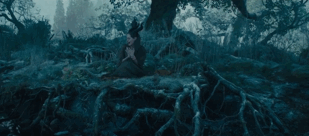
However, through her relationship with Aurora, Maleficent experiences a rebirth, finding love, forgiveness, and ultimately redemption. This journey from darkness to light mirrors the core symbolism of Punarvasu, which emphasizes cycles of transformation and rebirth after hardship.
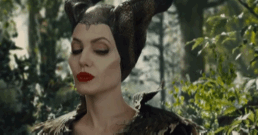
In connection with Punarvasu's ruler Jupiter, Maleficent could be seen as embodying a wisdom that transcends simple good and evil.
by the way, Maleficent is imbued with immense magical abilities, which can represent the vastness of Jupiter's energy. However, instead of using this power for guidance, protection, or wisdom (positive Jupiter traits), she initially uses it for destruction.
The burden of her vast power causes her isolation, mirroring how unchecked Jupiterian expansion can lead to loneliness and alienation. Her vastness becomes too much to bear, resulting in a disconnect from others, as she initially thrives in solitude and vengeance.
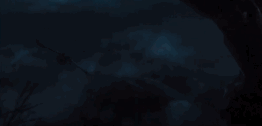
Claire touched upon this exact point in her punarvasu essay. the spirit of the vast and how punarvasu natives as well as punarvasu infused stories involve a character who is stripped from some privilege they had like beauty, strength or, in this case, powerful wings. they undergo a period of seclusion from the rest of the world, usually in a boundless castle or even kingdom with countless treasures, they are unable to share, as they were stripped of what made them beautiful (ex.: maleficent and her wings). through this reclusive era they are bound to redeem themselves and operate from a space of love and light, in order to forever let go of their bitterness.
Similarly, the Beast is cursed and trapped in a monstrous form due to his previous arrogance and cruelty. His transformation begins only when Belle enters his life and teaches him the value of love, compassion, and selflessness. The same way Aurora softened Maleficent’s harsh heart.
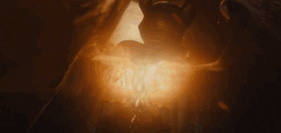
Both Maleficent and the Beast illustrate Punarvasu's core themes of renewal, redemption, and the nurturing power of love. In both stories, we see characters who undergo personal destruction and emerge transformed, better versions of themselves.
#astrology observations#astrology#astro observations#vedic astro notes#vedic astro observations#vedic astrology#punarvasu#maleficent#Jupiter
110 notes
·
View notes
Text
he preserved his own happiness emilie so desperately wished he’d retain after her passing, despite living in an environment that did nothing but isolate and alienate him. despite being “raised” by a man who was too absorbed by his own grief and greed to appreciate his (very much alive) fourteen year old son rather than his long-gone wife.
instead of allowing himself to succumb to an everlasting cycle of grief and sadness, like many would do even with a reliable support system, he chose to seek out connections with others that he lacked with his father.
he chose to protect paris despite never being protected himself. he chose selflessness, which undoubtedly helped him discover himself.
against all odds, he chose happiness. i am so proud of you adrien agreste

#ml#miraculous#miraculous ladybug#ladynoir#chat noir#ladybug#mlb#miraculous fandom#adrien agreste#marichat#ladrien#adrienette#marinette#marinette dupain cheng
103 notes
·
View notes
Text
Why did God abandon Dostoevsky & how Osamu Dazai can help Fyodor regain his humanity (bsd analysis)
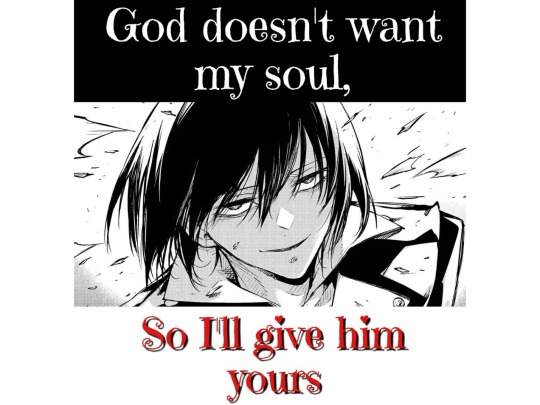
1. Heaven out of reach
Dostoevsky firmly believes that every sinner should be redeemed, recycled and turned into a pure light ascending to paradise. Sadly, ability users are oblivious to their sinfulness. They're too stupid to die themselves. So Fyodor has to help. He's going to be the one to set them on the right path. They're all be in heaven soon enough.
But if Fyodor believes that he can send anyone to heaven, why isn't he going there himself?
He paradise as a savior, while fearing that his soul isn't worthy of salvation.
Fyodor is convinced: if he dies now, God will just cast him into oblivion as a punishment for what he's done. And to avoid it he has to “redeem” himself by “saving” others.
It's an endless cycle. What does Fyodor blame for being stuck in there? An ability that has been corrupting his mind for centuries.
So we have an interesting paradox: Dostoevsky believes that he can send people to heaven, but he himself can't go there (yet).
So what's so wrong with Fyodor's soul? (apart from committing thousands of crimes, of course).
Let's start with the belief behind his motivation: “All abilities are sinful without expectation”.
What's so bad with having a special skill? Why does Fyodor see them as bad and evil?
From Fyodor's perspective, every ability is an abnormality that defines God. A special skill could give its owner a chance they weren't meant to have in the first place. It goes against the laws of reality and God's plan.
It also creates a huge power imbalance between a skill user and everyone else. It gives them some extra “temptation” in the form of a power that's difficult to handle.
This cursed gift alienates a person, pushes them into isolation, makes it harder for them to relate to others. All because a special ability changes the way it's user perceives reality with everyone in it. It morphs their world view, leading them away from humanity.
And heaven is created for humans and maybe other pure animal souls. The “inhuman”, abnormal skill users don't belong there anymore. Their unnatural talents distort their very core.
At least, Fyodor thinks like that.
This is Dostoevsky's ideology in a nutshell: Special ability corrodes its user's humanity and makes them unworthy of heaven.
Where did Fyodor get this from? His own life experience and the pain he's been feeling for a very long time.
2. Fyodor's broken dream and how his ability ruined his self-esteem
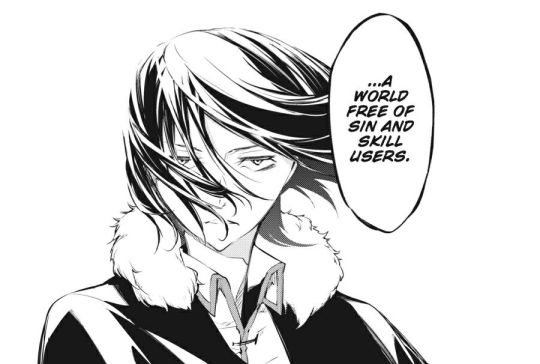
Fyodor Dostoevsky seems like a person who's probably wanted to die early and become as symbol of his beliefs (that's why he has “clicked” with Nikolai Gogol so easily).
Maybe, an idea of becoming a martyr was alluring to him. Martyrs sacrifice their lives for something greater than themselves. After their death, they often become saints. They're worshiped and praised for being selfless, virtuous, and kind. They're considered beacons of light that lead everyone to paradise.
And become Fyodor is heavily influenced by an early orthodox Christianity, he has probably read a lot about the lives of saints. To the point he wanted to become one himself.
For someone, like Dostoevsky, who was most likely terribly unloved throughout his formative years, an idea of being loved, even worshiped, after death is very tempting.
So it's not a far stretch to say that Fyodor dreamt of becoming a martyr, and welcomed an early death as a ticket to paradise.
And well, you can guess, how it all turned out.
Due to Fyodor's ability, he can't die as a martyr at someone's hands. He can't clear his sins with his blood. That means, regardless of what he does, he won't ascend to Heaven or become a saint through the deathly suffering someone inflicts on him.
Of course, not all saints were killed by someone in a painful or brutal way. Some of them met a very peaceful end. But knowing Fyodor, he probably believed that the best way to get rid of his sins is to suffer and die.
And then, this plan didn't work out. Fyodor learned that he had an ability, that defies a death itself. So no matter what sins he committed throughout his life, he couldn't redeem himself by dying. He died, and died, and died. But he was unable to go to paradise.
Maybe, at first, Dostoevsky thought he had a “set amount” of lives, like cats that are supposed to have 9. So he probably got himself killed multiple times, but with no result.
At one point, it clicked in Fyodor's head:
What if he can't be accepted to Heaven as he is now?
What if it made Fyodor think that God found his soul so repulsive, he couldn't die during his first “death”?
Dostoevsky started fearing that God didn't want him, and therefore he couldn't meet his creator in the afterlife. Perhaps, Fyodor decided that his ability made him so unworthy, he couldn't even come close to God.
“Crime and punishment” postpones Dostoevsky's demise. It goes against God's plans and resets the time at which Fyodor has been “meant” to die. His ability is so unnatural, it distorts the death itself. Maybe, that's what angered the creator?
Even more so, dying humanizes people. “Everyone dies”. It's something everyone believes in. According to some Christian believes people live, die and then their souls get evaluated in order to be sent either to hell, heaven, or limbo. Except for Fyodor. He can't even face the trial. At least via his preferable way of dying.
What other ways of achieving death does he have?
It's either suicide, an accident or an old age.
I doubt that Fyodor would willingly kill himself by the poison injection or some other method. It's not that he doesn't want to. His suicidal ideation is pretty strong. But unaliving oneself is considered a sin in many religions, especially in the orthodox Christianity from the early days. And Fyodor is afraid of Hell and God's wrath.
Dying from a disease or an old age won't do either. Since Fyodor considers himself very “sinful”, he craves a redemption as big as the crimes he committed. Cue his dreams of being a martyr.
But if Fyodor just waits until his body gets old and dies, won't it mean that he's gotten an “easy” way out? Will God forgive him after that? Unlikely. He'll probably get stuck in limbo, somewhere in between, and he can't live with it.
So if Fyodor gets killed by his own body, he won't go to heaven. 'Cause he wouldn't repent for the sins he already committed.
The same goes with the death by an accident. Dying too early means not earning God's forgiveness. Plus, if an accident is caused by another human, he'll still get reincarnated into their body.
“No longer human” could apply to Dostoevsky so well. How can he be human if he can't experience death like everyone else?
Wouldn't it mean that he was already marked as a “worst sinner of all” even before he was born?
Dostoy probably thinks that he isn't worthy of Heaven YET, or he hasn't done enough to earn his place there. For centuries, no one has been able to give Fyodor the gift of “absolute silence” (death).
So Dostoevsky didn't die as a martyr = didn't purify himself= couldn't ascend to Heaven.
It doesn't seem that Fyodor wants to live. He is exhausted, angry and almost lucid. But his consciousness clings to one idea: that all of this will get better, if he just “removes” his ability from himself.
This is why Fyodor is also afraid of dying NOW, before he can pull off his world-changing plan.
Dostoevsky thinks that until he'll get rid of his ability, he won't be accepted into Paradise. He is terrified that if he dies without removing “Crime and punishment” he will be doomed to endless suffering.
So he wants to make a sacrifice. He'll sacrifice what's left of his humanity, sanity and any personal connections. He'll erase any traces of desire for comfort and salvation by life, not by death.
His place on Earth will be sacrificed for his place near God.
That was his plan all along.
But then… Dazai came.
3. Osamu Dazai is what Fyodor can be if he gives a chance to his humanity
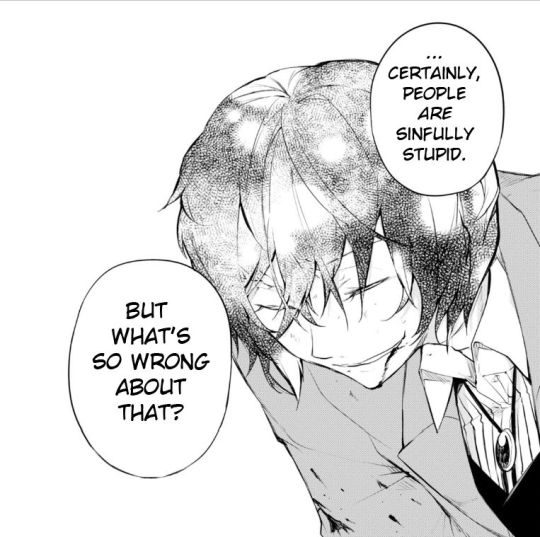
Dazai did what he does best: intervened with the plans and mixed up everything else.
Now Fyodor's sinful ability could be erased by the touch that wasn't God's at all. Now he could be killed by another human being. Now he could risk dying and seeing what was on the other side.
But Dostoevsky was terrified. After so many centuries of avoiding death, it almost became a reflex.
The more Fyodor lived, the more he sinned, the more he got scared of would happen to his soul in the end. And as a result, he became even more attached to his plan of “earning God's forgiveness by purifying the mankind”.
But then Dazai entered the scene and introduced Fyodor to another side of God, a side he used to overlook for so long.
Dazai believed in another version of a Devine being. And his was far more realistic and convincing. The God that Osamu envisioned was different. He was forgiving, messy, humane, and capable of change.
And of course, Fyodor could use his favorite trick to debunk this belief. “He is too stupid to understand anything”. Only this ploy wouldn't work this time. Because Dazai was smart.
That's why, in Fyodor's eyes, Osamu was so disgusting. He was intelligent enough to be different from everyone else, but somehow it didn't cause him to feel the same isolation Fyodor had to suffer through for all these years. At least in the present days, Dazai had friends, colleges, and aspirations. And he was capable of winning their chess game over and over again.
This made Dostoevsky's core belief shake up a little bit.
Did Heaven really exist? Did Fyodor choose the right pass to get to it?
Dazai made him doubt the way he acted. That's why Dostoevsky was so angry. Osamu threatened his faith. That was unforgivable.
Feeling cornered, Fyodor threw every bit of the intellect he had to destroy the agency and the bandaged man.
If Fyodor won, it would mean he was right all alone.
And if he didn't… He would die as a sinner, unloved by the very God he sought.
Impossible.
4. Two Gods and one desire: to reunite with a humankind

Fyodor says that God is a perfect, intangible being that loves ideally planned things. To be like him, one needs to be objective, emotionless, and prepared to discard everything for the greater purpose.
Dazai says that God is humane, imperfect and made of everyone's desires and emotions. Therefore, to be like him one needs to be a human to the best of their abilities.
Fyodor craves the love that Dazai's God can give him. He secretly wants all the imperfect, fun, messy things that can give his life a meaning. But humanity scares him. It's too unpredictable, wild, and difficult to control.
So human God terrifies him to the core.
It's a tragic a case of “want this, but need that”. Fyodor chases God, but craves humanity.
Dazai had to learn how to be human, and Dostoevsky could do it too. But Fyodor is too stuck in his ways to see another perspective. He doesn't know how to change, so he pretends not to care.
Until all the Fyodor's defenses will be completely demolished and broken down, he won't even allow himself to change his mind.
Maybe, his salvation will happen through death.
But it doesn't have to be this way.
#Bsd spoilers#bungo stray dogs#bungou stray dogs#dostoevsky bsd#bsd analysis#bsd theory#bungou stray dogs character analysis#my analysis#fyodor dostoevsky#fyodor#bsd dostoevsky#fyodor bsd#bsd fyodr#bsd#bsd spoilers#dazai osamu#dazai#dazai osamu bsd#bsd dazai#dazai bsd#osamu dazai#fyodor dostoevsky bsd#Fyodor Dostoyevsky#Dostoyevsky
76 notes
·
View notes
Note
What is the role of Mr. Sun, Tree, and Fun Computer in the au?
Okay okay okay we've been turning this ask around in our head for dayssssss. We haven't fully ironed out the ideas for this AU's Fun Computer yet, but we do have some lore for Sun and Tree!!


Mr. Tree is one of many creatures often nicknamed "Sprunktrees", ancient plant mimics that evolved to live alongside Sprunkis! They magnify and gain energy from the music that Sprunkis are constantly creating, which allows them to grow almost as large as real trees, live for startlingly long lifespans, and create high energy "fruit". It's a mutually beneficial relationship!
A bit of an odd case, Mr. Tree is the only one of his kind in the village that Hatter arrives in. It very much on the small side as far as Sprunki towns go, as well as a tad isolated.
The village sits at the edge of the forest in which Mr. Tree's main body resides, and is a bit far from any other town. It's quaint, quiet enough that Mr. Tree has hardly any trouble maintaining it on his own, especially with Mr. Sun at his side.
As for Mr. Sun... (warning for horror below)
Sun, like Tree, is just mimicking his namesake! He isn't the actual sun, nor does he control the day/night cycle. He does produce light and warmth, but not much more than the light/heat given off by one of Garnold and Clukr's more energy-intensive machines...

In reality, Mr. Sun is another alien of the same species as Hatter. His "sun" appearance is his preferred form, but he's also able to take a Sprunki form at will.
He, like Hatter, was a researcher who arrived long ago to study the strange nature of the Sprunkis and their world. Of course, he meant no harm, and he eventually chose to retire from his work to live out the rest of his days alongside Mr. Tree.
When he returns from a stroll one morning to find Mr. Tree reduced to an unresponsive husk, this throws a bit of a wrench in his plans..

With the forest's source of stability incapacitated, the monstrous corruption of the Sprunkis at the hands of Hatter becomes a trivial matter...
Mr. Sun himself in "horror" form is little more than an ominous, looming presence for most of the story. The cause for his frightening appearance is purely emotional, not any symptom of poisoning or mutation like the abnormal Sprunkis. Other than the grief that haunts him, he's still himself.

Still, he's not much help, either. His disguise is only physical enough to touch, not to fight, so he can't do much to directly aid the survivors. Any knowledge that he has that could help against Hatter, he's also reluctant to share. After all, if he reveals what he knows, it will become immediately obvious that he's not what he seems either....
... and he can't stand the thought of the Sprunkis coming to distrust him, too.
#sprunki#sprunki mr tree#sprunki mr sun#sprunki black#sprunki green#sprunki au#fluffyscribblez#//just to be clear Mr. Tree is NOT dead in the AU//#//he's Abnormal/mutated but he has enough willpower to avoid completely losing it//#//unfortunately it takes literally everything out of him to do so - meaning he's essentially forced into a deep hibernation//#//mr sun to hatter be like “were it not for the laws of physics i would have ended you :D”//#//this post got much longer/more lore heavy than anticipated lol//
34 notes
·
View notes
Text
Tech's Encrypted Files Masterlist

[Initiating connection…] [Connection successful. Transmitting…] Subject: Tech - Personal Journal Entry This transmission marks the beginning of a new phase in my process of self-discovery. The objective is simple: to explore and document my experiences as I prioritize my own well-being for the first time in an extended period. I’ve realized that for much of my life, I’ve operated within predefined roles—first as part of the army and later as a partner to Leena. In doing so, I lost sight of my personal identity, possibly never fully understanding who I was outside of those functions. I now acknowledge that I am entering a phase of recalibration. This space will serve as a log for my journey, an area to process my thoughts and frustrations. I will also address the feelings of alienation I’ve experienced, particularly in light of being the one to initiate the divorce. It is important to clarify that this decision, though difficult, was made after considerable analysis of the emotional status between both parties. The action taken was an effort to end the cycle of mutual discontent. I harbor no ill will towards Leena; rather, I am simply exhausted from repeatedly failing to accommodate her desires while being unable to be myself. I still care deeply for her, but I believe this decision offers her the opportunity for a life without the restraint of my need for structure and isolation. I will also note the recent formation of a new connection with Marina, a widow from Pabu, whose existence I was previously unaware of. This individual has provided a new perspective, and I am inclined to continue exploring this relationship. I look forward to learning from her experiences, particularly in navigating life after the loss of a partner. Despite being a divorcee, I recognize that there are valuable insights Marina can share—insights that may help me understand my own path forward in a similar context. End transmission.
Art
Between Hearts and Ruin Event
Goggle-Eyed
Tech's Encrypted Files 2
Tech's Encrypted Files 3
Stories
(All these stories are by @legacygirlingreen)
Between Hearts and Ruin Event \_> I: "Breaking the Silence" \_> II: "Someone New" \_> III: "Spontaneity"
Goggle-Eyed (By @legacygirlingreen)
"Lady By the Sea" (By @legacygirlingreen)
\_> Part 2
Data Log Entry 1

Entry 2 Entry 3
20 notes
·
View notes
Text
Talked a lot about how the Diaz Parents failed Eddie but not enough about how they failed Christopher
Like He was born to Teen Parents, Eddie and Shannon were kids struggling with responsibility and the Diaz Parents were right there the whole time
The Fact Shannon felt so isolated and alone with Eddie in the Army because they wouldn't support her beyond their own selfish desire to take over
If they had provided a proper safe and supportive space for Shannon, it's unlikely Shannon would have broken, felt the need to run, that she was a failing mother, That Chris would be better without her
Then they immediately repeat the same cycle with Eddie, who is recovering from PTSD and needing to work three jobs, making him feel isolated and Alone
Eddie couldn't flourish as a father till He got to LA, where He gained that support of Isabel and Pepa, then Buck and the 118
And now they've taken Chris, taking advantage of Eddie's guilt and fear, and are doing nothing to help Chris reconcile
Their constant failure to support Chris' parents have only ever helped alienate Chris from his parents, and you can see how that's negatively effected Chris
And that's on them, they failed their Son and Daughter in Law, and that harmed Chris
#911#911 abc#eddie diaz#Biting the Diaz parents#im so fully of fucking rage at them right now#Eddie and Shannon were kids and they let them drown so they could seem like the saviours#christopher diaz
23 notes
·
View notes
Text
Mikage: Boy of the Black Rose
I've long struggled to write about Mikage, who I find to be an intriguing yet elusive character. or rather, his character is understandable--his motives and feelings are communicated clearly enough--but his narrative is one of the most inexplicable in RGU. thinking it over tonight, I put my finger on one aspect of the Black Rose arc which I previously didn't know how to approach: specifically, Mikage's relationship with the Boys of the Black Rose.
the boys act as a kind of collective character, a mass of faceless people who whisper in dark corners. since RGU is about social reality, it often uses extras to deliver exposition or set the mood. the Shadow Girls are meta characters, existing somewhat outside the narrative, but regular schoolgirls at Ohtori can serve a similar purpose. they might demonstrate that Touga and Saionji are considered the hottest boys in school, or gossip about Ruka and Shiori's recent breakup.
the Boys of the Black Rose are slightly different, maybe a little closer to the Shadow Girls. rather than acting as bit characters in the larger world of Ohtori campus, I believe their existence is contigent on Mikage. while this could be put in various ways, in the most straightforward terms, the writers created them to help reflect on Mikage's character.
only one Black Rose Boy is given a face: the first one Mikage (Nemuro) talks to. when Mikage asks not to be called "professor," since they are the same age, the boy replies:
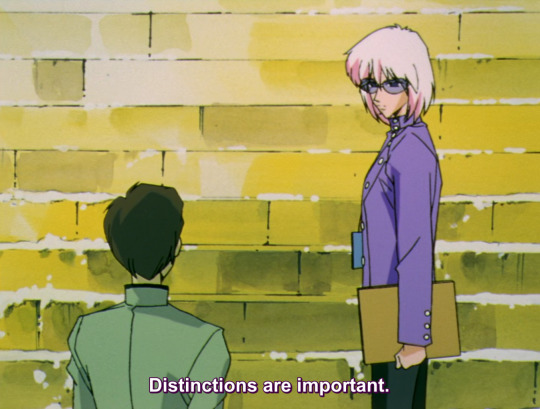
obviously, RGU relies on making its main characters visually distinct from "normal people." Wakaba calls them "special" and resents them. Utena is popular for her specialness, well-liked; in contrast, Mikage is an outcast for his. for a person to be special or a genius, there must be others for them to stand in opposition to. Mikage is set apart from his peers by his pink hair, by his unique uniform, and by being a professor.
after Mikage is introduced to his new work, the boys begin to gossip about him, saying he knows nothing about what's really going on at Ohtori. towards the end of this conversation, there's a shot of Mikage, and then he actually replies from the future to the gossip they were spreading about him.
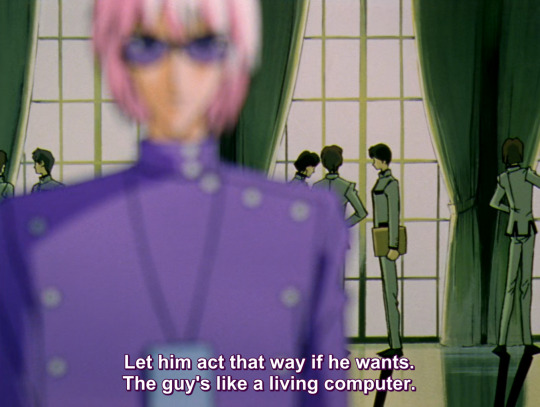
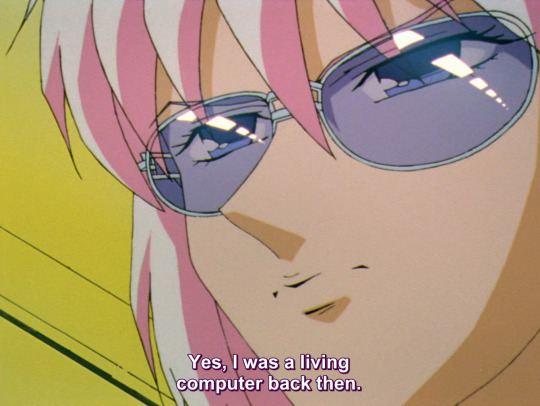
this is Mikage's eternal reality: his recollection of the past. even during the "present" of Utena's narrative, he is still walking through Nemuro Memorial Hall, which is why it's still standing, unburned. the Boys of the Black Rose that the audience sees are filtered through Mikage's memory; whether or not the boys really said these things about him is ambiguous. it's possible, but the important fact is that Mikage believes they did.
this transpersonal mirroring keeps Mikage trapped, unchanging. he feels himself defined as unable to connect with others, so he keeps away from them. this becomes a self-perpetuating cycle, leaving Mikage a total outcast.
even outcasts, however, are members of society. the Boys of the Black Rose actually have more in common with Mikage than the average Ohtori student. they're all scientists working on the same project. they have much of his coldness, sense of superiority, and intellectualism. the main difference is that they're the in-group.
while Mikage believes himself to be emotionless, it's made clear that his social isolation hurts him. he doesn't want to be set apart, but he doesn't know how to break through the barrier between him and others. it's very easy to do a queer reading of the character, given the way this is conveyed to the audience.
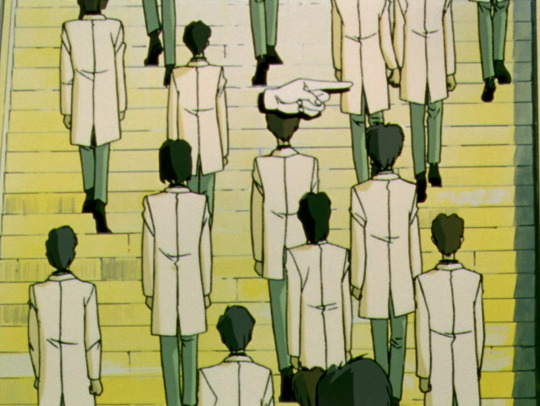
Mikage's fixation on Tokiko and Mamiya is easier to undestand with all this in mind. the world he was living in, occupied by the Boys of the Black Rose, was a cold and alienated one. in contrast, Tokiko has genuine passion, caring for her brother deeply. Tokiko's tears move Mikage, allowing his own buried emotions to break through the surface. but she also reinforces his social isolation; he is equally as hurt by her as he is drawn to her.
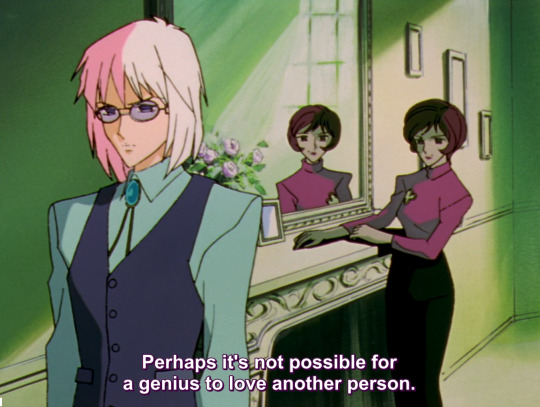
this is part of why Mikage is so determined to "defeat" Tokiko; she offered him hope of connection, but he was never able to "win" her, as men so often try to do with women.
Mamiya is something else altogether; a boy, like Mikage and the Black Rose Boys, but altogether different. warm, friendly to Mikage, not intimidated by his intelligence or reputation, and insightful. in a show full of characters obsessed with holding on (to the past, to a person, to their self-image), Mamiya is the only one who can see the wisdom in letting go.
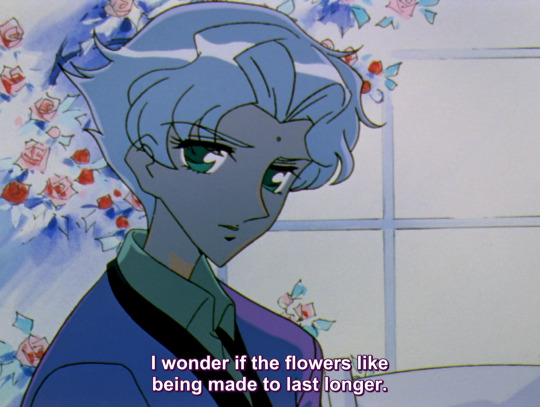
Mikage at first is open to Mamiya's words, preparing to call off their quest for eternal life. but like every character who threatens the system in RGU, he is faced with Akio. in a prototype of the later "End of the World" sequences, Mikage comes across the kissing Tokiko and Akio. this proves to be too much for him; there are some things he can't afford to lose.
the scene has significance to Mikage far beyond disappointment in love. he wanted to create a family with Tokiko and Mamiya; marriage to Tokiko would tie them together "forever." if he could be by Tokiko's side as they lost Mamiya, then at least he wouldn't be alone after his death. but if he's only Tokiko's coworker, when their work is done, he's back to being a computer.
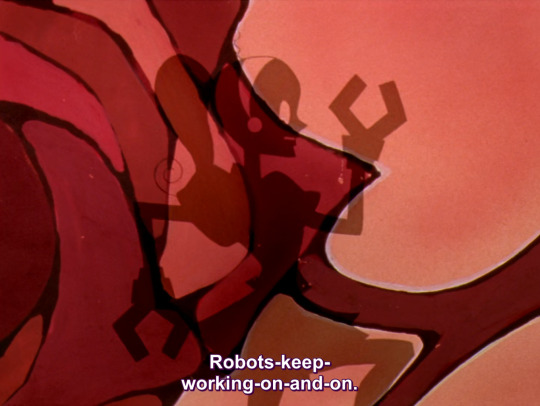
in desperation, Mikage plays into Akio's hands. under contract, he sacrifices the Boys of the Black Rose and burns down the hall that bears his name. when justifying himself to Tokiko, he claims that this act will allow them to attain eternity. in the events of the series, he's still at it: installing Mamiya as the Rose Bride will, after all, make him eternal, even though it's the very kind of eternity Mamiya wanted nothing to do with.
Mikage retreats into delusions on feeling the sting of Tokiko's rejection. though he is the one who betrayed her, he turns it around and feels betrayed himself. going even further, he casts Mamiya as the one who set the fire.
the Boys of the Black Rose are also used to emphasize his inability to face his own actions. throughout the arc, the boys are seen pushing coffins around. however, in episode 23, Mikage takes their place right before he is forced to face the truth about himself.
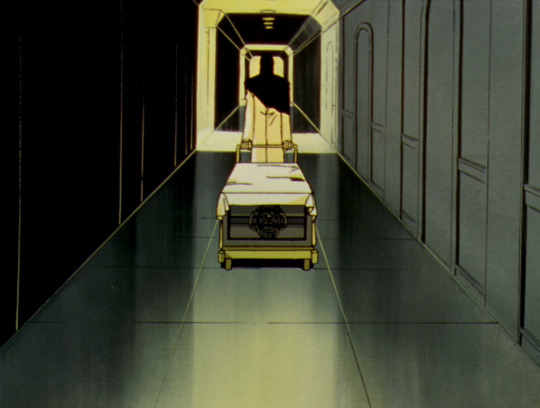
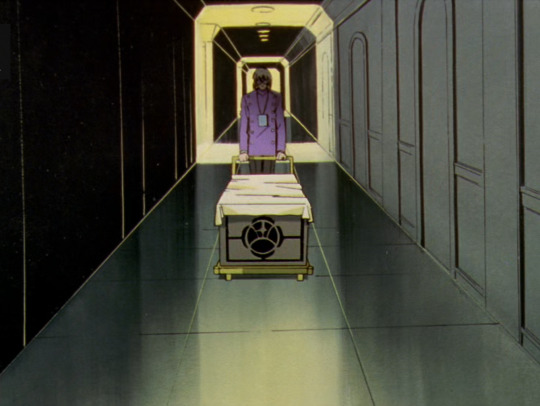
at the end of the arc, Miki claims that no one was hurt in the the fire, contradicting the previous story of Nemuro Memorial Hall. this possibly indicates that the murders are a figment of Mikage's imagination--the older Tokiko doesn't seem to react to him as if he's a murderer. more than anything, he seems guilty of self-denial and retreat from reality. Tokiko went on to accept Mamiya's death and even mourned for Mikage, while he ignored her in favor of his memories. the fact that he does not recognize her feelings is another aspect of his tragedy.
Mikage, through his fruitless revolution, loses the very things he always wanted. he attempts to throw away his past self, the cocoon of Nemuro hatching into the butterfly that is Mikage. with it, he burns away the boys who rejected him, who embodied the cold world he used to live in. he uses their sacrifice to enshrine Mamiya, idealizing him as the perfect companion. but as Ikuhara said, he was doomed to fail from the start:
Those who reject that place are, conversely, rejected by it as well. This is the nature of systems: the moment you reject them, you are forced to realize that they’re the very ground you’re standing on. Mikage noticed the trick behind the system, and he hurriedly attempted revisions. But the adult who’d created the system just said “Let’s not,” and unilaterally brought the curtain down.
the "trick within the system," is, I think, the fact that it's socially constructed. Mikage believed that on realizing this, he could simply remake the world as he wanted. he was allowed to do so for a time, when it was useful. when he ceased to be useful, he was dispatched with, because while he had operated within the system, he was not in control of it. and beneath his delusions, there was still a reality.
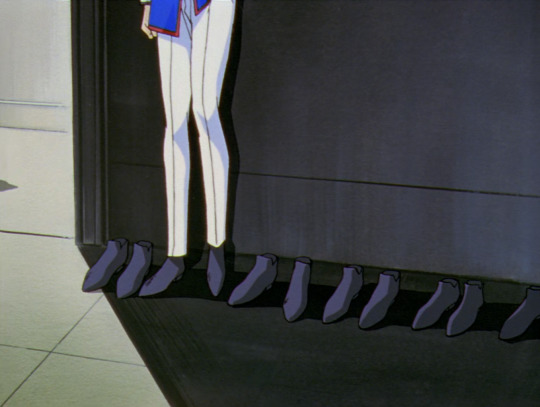
Mikage is the true Boy of the Black Rose: the true ghost, the true sacrifice, living in the desiccated world of a preserved flower. throughout the arc, he takes possession of Ohtori students who suffer from the same afflictions as him, and every time Utena defeats one of his duelists, another part of him is exorcised--another Black Rose Boy burned away. in the end, the only thing left of him is the ruin of Nemuro Memorial Hall, shown briefly in the final episode. he graduates at Ohtori, but only after losing absolutely everything. that seems to be the only way to step into adulthood: naked and shivering, like the day we are born.
155 notes
·
View notes